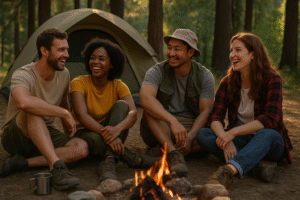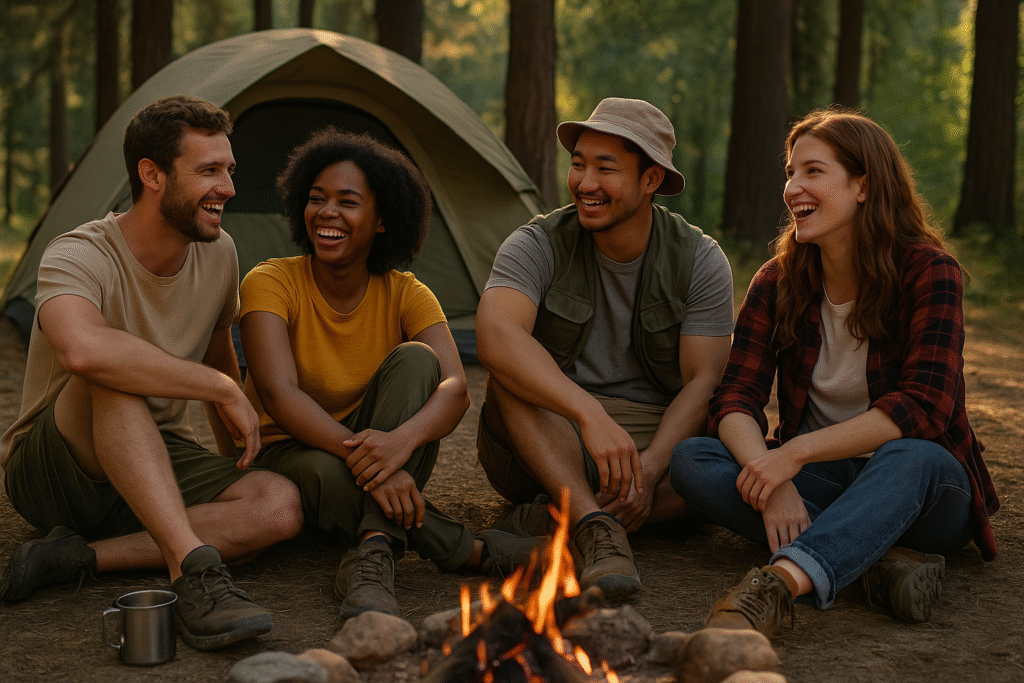Camping is an unforgettable experience: being close to nature, breathing fresh air, and disconnecting from the daily routine. However, along with this peaceful atmosphere come the little villains that can ruin the adventure: insects. Mosquitoes, ants, flies, and even ticks can easily turn a pleasant night into a nightmare. The good news is that there are several practical and effective ways to keep them away.
In this article, you will discover 7 essential tips to protect yourself from insects while camping, ensuring a safer and more comfortable outdoor experience.
1. Choose the right campsite
The first step to avoid insect-related problems is to pick the right spot for your tent.
-
Stay away from lakes, rivers, swamps, or areas with standing water, since these are natural breeding grounds for mosquitoes.
-
Look for clean, open ground without piles of leaves, fallen logs, or anthills nearby.
-
Whenever possible, set up your tent in slightly elevated areas where the breeze helps keep insects away.
This simple decision can drastically reduce your exposure to biting insects during your stay.
2. Always carry insect repellent
An insect repellent is a non-negotiable item for any camper.
-
Apply it on exposed skin, especially in the evening and at night when mosquitoes are most active.
-
Look for repellents with DEET, Icaridin, or IR3535, which provide longer-lasting protection.
-
Reapply as directed on the product label, particularly if you sweat a lot or go swimming.
Some repellents can also be sprayed on clothes or around the tent entrance for extra coverage.
3. Wear protective clothing
Your clothing is also a powerful defense against bites.
-
Opt for long-sleeved shirts, long pants, and thick socks, especially after sunset.
-
Choose light-colored fabrics, as they attract fewer insects than darker tones.
-
In areas with a risk of ticks, tuck the ends of your pants into your socks or boots to create a physical barrier.
This not only helps against insects but also protects your skin from scratches and allergic reactions to plants.
4. Keep your tent sealed
Think of your tent as a safe zone — but it only works if it is properly sealed.
-
Always zip up the doors and vestibule completely.
-
Choose tents with mosquito netting on doors and ventilation windows.
-
Before going to bed, do a quick check to make sure no bugs sneaked inside during the day.
A small floor mat at the tent entrance is also useful to clean your shoes and reduce the chance of bringing insects in.
5. Store food correctly
Food is one of the main attractants for insects and even bigger animals.
-
Keep all food in airtight containers or sealed bags.
-
Avoid leaving food scraps or wrappers near the tent.
-
Wash dishes and utensils right after meals.
These precautions help prevent ants and flies from approaching your camping area.
6. Use natural insect deterrents
In addition to commercial repellents, some natural methods can help.
-
Citronella and lemon eucalyptus are well-known for repelling mosquitoes. Candles, essential oils, or sprays can add an extra layer of protection.
-
A campfire not only provides warmth and light but also keeps bugs away thanks to the smoke.
-
Fresh herbs such as rosemary and mint placed near your tent can act as natural insect repellents.
While they don’t replace conventional repellents, they work well as a complement.
7. Be extra cautious at night
Nighttime is when insects are most active, so extra attention is necessary.
-
Reapply repellent before bedtime.
-
Avoid keeping bright lights on inside your tent, as they attract moths and mosquitoes.
-
When walking outside at night, choose a yellow-tinted flashlight, which is less attractive to bugs than white light.
Following these steps will help you sleep peacefully without worrying about bites.
Conclusion
Staying protected from insects while camping is all about planning and consistency. From the moment you choose the campsite until you get ready to sleep, every detail matters. Not only can insect bites be uncomfortable, but some species also carry diseases — which makes prevention essential.
By following these 7 practical tips, you can ensure a safer, cleaner, and more enjoyable camping experience. Instead of worrying about bugs, you’ll be free to focus on what really matters: enjoying nature.

🔥 Make Your Camping Easier and Safer
The Gas One GS-3400P is a portable dual fuel stove that works with both propane and butane,
giving you unmatched versatility anywhere you go. Compact, lightweight, and equipped with a carrying case,
it’s perfect for camping, hiking, or even emergency preparedness at home.

📖 Want to Learn More?
Dive deeper into the fascinating secrets of the Paricá Tree (Schizolobium parahyba)
and discover why this native species is so important in Brazilian culture and ecology.

